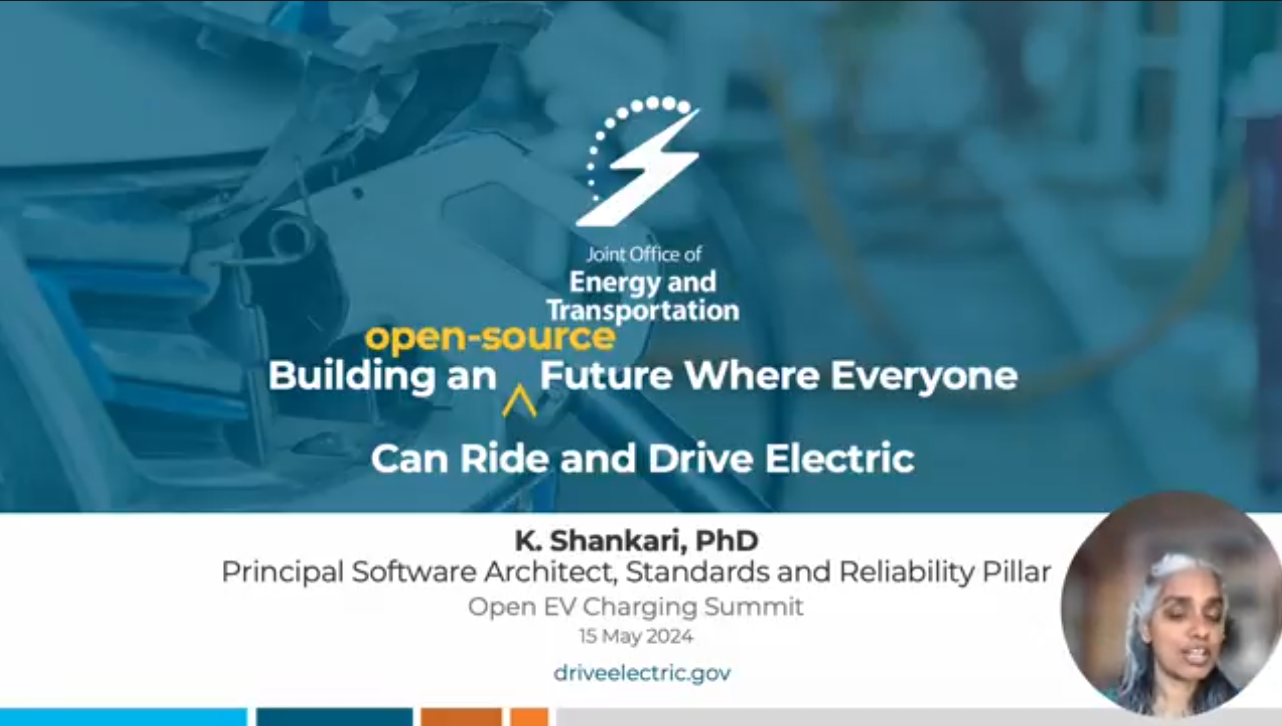Open EV Charging Summit Recap and Video: Accelerating EV Charging Tech Deployment
In a session at the Open EV Charging Summit, Dr. K. Shankari, Principal Software Architect at the U.S. Joint Office of Energy & Transportation, shared valuable insights into supporting standards compliance and accelerating technology deployment through open source initiatives (video follows below). Here’s a summary of the key takeaways:
- Building a Sustainable Future: The U.S. government is committed to reducing transportation emissions and achieving President Biden’s goal of a net-zero emissions economy by 2050. To accomplish this, federal agencies are collaborating with various stakeholders to advance low and zero-emission transportation solutions. A crucial component of this plan is the development of a robust nationwide charging network for electric vehicles (EVs).
- Charging Infrastructure Programs: Dr. Shankari highlighted several programs aimed at expanding EV charging infrastructure across the nation. Notable among these are the NEVI Formula Program and NEVI Discretionary Program, which provide significant funding for deploying EV charging infrastructure along travel routes and in communities. Additionally, funds are allocated for electrifying transit and school buses, emphasizing a comprehensive approach to decarbonizing transportation.
- Complex Charging Ecosystem: The EV charging ecosystem involves numerous stakeholders and requires seamless interaction between various components, including chargers, grids, and EVs. To ensure reliability and interoperability, proposed NEVI standards and requirements aim to establish secure data transfer protocols across the ecosystem. Dr. Shankari stressed the importance of supporting industry efforts to implement vehicle-to-grid standards and open charge point protocols.
- Open Source Reference Implementation: A pivotal aspect of supporting standards compliance is the development of an open source reference implementation for EV charging infrastructure. Dr. Shankari discussed ongoing efforts, including the Applied Interoperability Project, which aims to create a standardized stack for testing and validation. Through Dockerized environments and automated testing pipelines, stakeholders can validate software compatibility and ensure robustness.
- Enabling Grid Integration: Open source initiatives facilitate the integration of EV charging infrastructure with the energy grid, enabling dynamic energy management and demand response functionalities. Dr. Shankari showcased demonstrations of simple software-in-the-loop simulations, illustrating how various modules interact within the charging ecosystem. These simulations provide valuable insights for developers and industry stakeholders, ultimately facilitating smoother deployment of EV charging technology.
Dr. Shankari’s presentation underscored the importance of open source collaboration in advancing EV charging technology. By fostering interoperability, reliability, and grid integration, these initiatives play a crucial role in accelerating the transition to sustainable transportation infrastructure.
